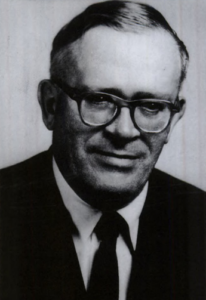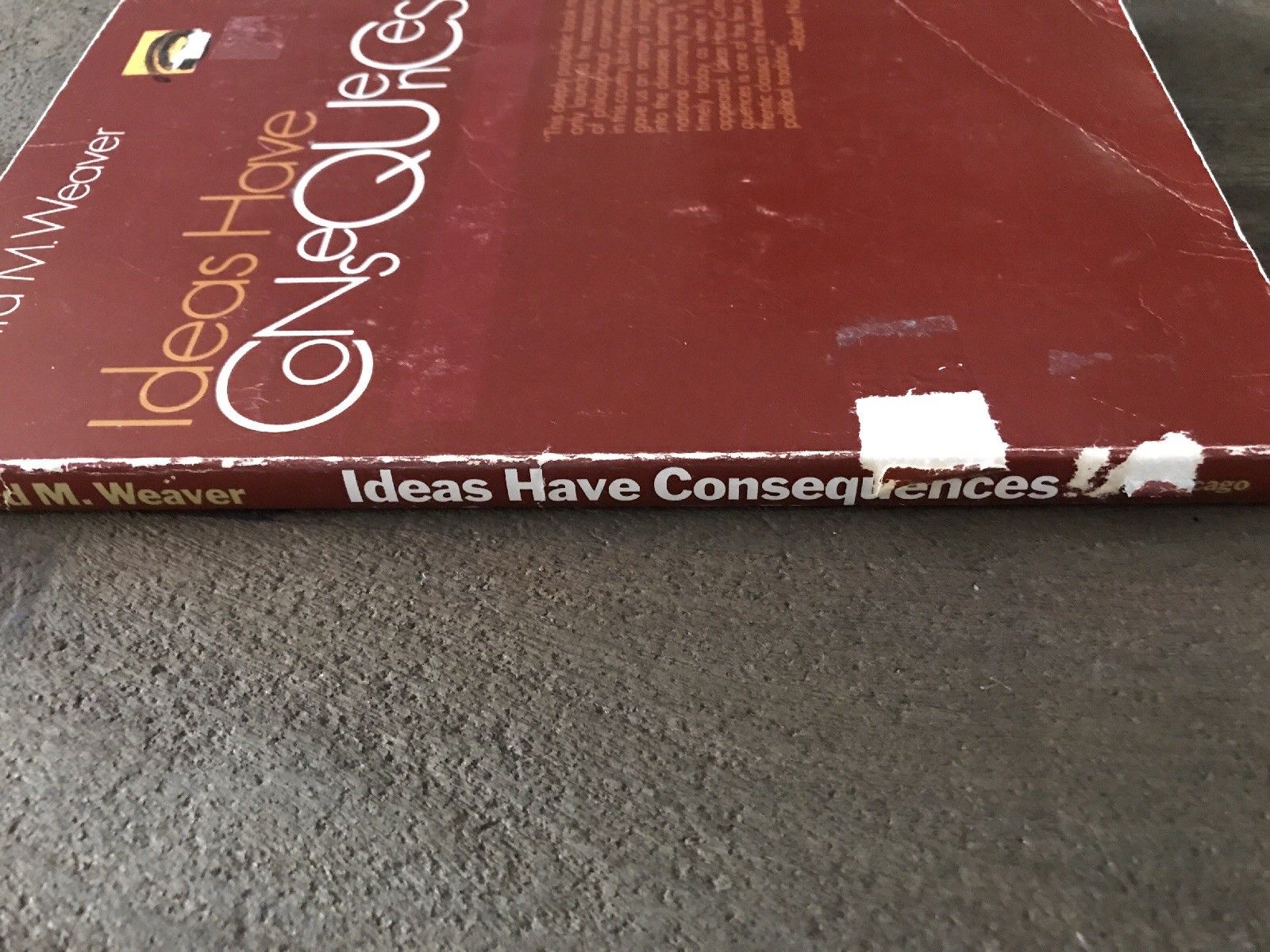As I mentioned previously, I have been reading through Richard M. Weaver‘s Ideas Have Consequences, and realized that it brings up some worthy topics for discussion, namely the role of truth in a society, and how that fundamental concept has been twisted and garbled in the West over the past few centuries. Of course, many believe that the West was a paragon of goodness and virtue until the past few decades, but according to Weaver, the shift began 600 years ago. Sure, it was not fully corrupted until the mid-20th Century, but it began much earlier.
 If he is correct, we need to know what led to this shift and how to get back. It won’t do much good to restore what we had 40 years ago, if we will simply drift back here in a few years. It would be much more useful to fix the fundamental problems and shore up the base.
If he is correct, we need to know what led to this shift and how to get back. It won’t do much good to restore what we had 40 years ago, if we will simply drift back here in a few years. It would be much more useful to fix the fundamental problems and shore up the base.
Note that we are not talking about technology or things of that nature. Instead, this will focus on metaphysical or philosophical (even religious) concerns. They go deeper than the existence of technology and address things like how we use technology. In any event, those things should be clear as we move through Weaver’s arguments.
Now, I am not going to give much background on Weaver. You can look that up yourself, if you are so inclined. My purpose is to consider his content from this book. If you are not sure if you should trust him, then do some research on him. I find him credible, intelligent, and worthwhile.
So, to the task at hand. As I work my way through this content, I will simply address each chapter in the book individually. I will present a summary of his arguments and close with my own thoughts on the matter. So this first installment will cover his introduction.
He begins by stating the obvious: “This is another book about the dissolution of the West.” The prevailing modern notion is that things improve over time, and that the present is the point of highest development. In other words, due to scientific progress and the loss of a moral compass, people tend to believe that, due to evolutionary principles, things are moving from simple to complex, and therefore from worse to better. Weaver opines that “there is ground for declaring that modern man has become a moral idiot.”
So modern man, on the whole, is incapable of actually discerning better or worse, and over the past 600 years has replaced moral authority with the self. Here, he argues that the concept of individuality leads to anarchy, which is incapable of providing a cohesive culture. In his own words, “every man has been not only his own priest but his own professor of ethics,” and this is not desirable. How so? “The powers of darkness were working subtly, as always, and they couched this proposition in the seemingly innocent form of an attack upon universals.”
So he moves into the debate which I discussed in my previous post about nominalism and transcendence. Ultimately, is there a truth that is higher than, and independent from, man? Is what is real determined only by what a man can see and touch, or at least perceive? Is it possible that something exists that man cannot fathom? Before 1400, men would have answered that there certainly existed something transcendent – God. After William of Occam, that thinking began to shift, denying that universals have a real existence. “With this change in the affirmation of what is real, the whole orientation of culture takes a turn, and we are on the road to modern empiricism.”
This denial of universal truth leads invariably to the relativistic mentality of “man the measure of all things.” As such, modern culture is alienated from fixed truth. If it cannot be directly experienced by a man, he assumes that it cannot – and must not- be true. Only experience matters. That relegates all things to a subjective experience.
 This can only work if Biblical truth is ignored, of course. While the scriptures argue that “all men have sinned and fallen short of the glory of God” and that without God, man is a fallen creature, predisposed to a sinful nature, nominalism requires the opposite: man is, by nature, good. So this inherent goodness, and man’s ability to experience and reason, necessarily lead to an steadily improving culture. “The question of what the world was made for now becomes meaningless because the asking of it presupposes something prior to nature in the order of existents.” Without a doubt, this leads to a confrontation between religion and science. Religion looks to something beyond man, while modern science looks to man himself. [Ed. Note: Of course, science founded upon univeral truth is not contrary to religion. Weaver is discussing the modern variant that denies universal truth. He expands on this in a later chapter].
This can only work if Biblical truth is ignored, of course. While the scriptures argue that “all men have sinned and fallen short of the glory of God” and that without God, man is a fallen creature, predisposed to a sinful nature, nominalism requires the opposite: man is, by nature, good. So this inherent goodness, and man’s ability to experience and reason, necessarily lead to an steadily improving culture. “The question of what the world was made for now becomes meaningless because the asking of it presupposes something prior to nature in the order of existents.” Without a doubt, this leads to a confrontation between religion and science. Religion looks to something beyond man, while modern science looks to man himself. [Ed. Note: Of course, science founded upon univeral truth is not contrary to religion. Weaver is discussing the modern variant that denies universal truth. He expands on this in a later chapter].
Weaver then discusses various attempts by nominalists to explain where religion fits into the equation, with Deism, Materialism, and others such -isms, given attention. How each of these attempted and failed to address the reality of life is worth its own discussion, but for our purposes, let’s move to how Weaver considers the impact.
Leadership is a persistent issue that the nominalist worldview affects. For example, in the 17th Century, Weaver notices that on one side, a Royalist and learned defender of the faith leadership style was pitted against an Aristocratic intellectualism. which then morphed into Whigs versus Romantics. All of these were intellectually astute, but also “assiduously cut the mooring strings to reality as they succumbed to the delusion that man is by nature good.”
Soon thereafter came “the popular leader and demagogue, the typical foe of privilege…[which] in the United States replaced the social order  which the Founding Fathers had contemplated with demagogism and the urban political machine.” By the 20th Century, we saw the rise of the leader of the masses, which broke into two groups: sentimental humanitarians and elite remorseless theorists with no tie to sentimentalism. Here, we see the divide, in Weaver’s mind, between such leaders and Hitler and Stalin. One appealed to a nationalistic pride, while the other purported to adhere to intellectual rigor. Weaver condemns them all. They are all the product of a cultural facade built upon a faulty foundation.
which the Founding Fathers had contemplated with demagogism and the urban political machine.” By the 20th Century, we saw the rise of the leader of the masses, which broke into two groups: sentimental humanitarians and elite remorseless theorists with no tie to sentimentalism. Here, we see the divide, in Weaver’s mind, between such leaders and Hitler and Stalin. One appealed to a nationalistic pride, while the other purported to adhere to intellectual rigor. Weaver condemns them all. They are all the product of a cultural facade built upon a faulty foundation.
His argument, and the purpose of his book, is thusly: “This story of man’s passage from religious or philosophical transcendentalism has been told many times, and, since it has usually been told as a story of progress, it is extremely difficult today to get people in any number to see contrary implications. Yet to establish the fact of decadence is the most pressing duty of our time because, until we have demonstrated that cultural decline is a historical fact – which can be established – and that modern man has about squandared his estate, we cannot combat those who have fallen prey to hysterical optimism…we approach a condition in which we shall be amoral without the capicity to perceive it and degraded without means to measure our descent.”
So the reality of good and evil must be rediscovered and defined. Modern man must admit the possibility that his own experience is not the sum of all things. There must be some avenue for self-reflection and self-criticism, which necessitates the existence of personal humility, something sorely lacking in modern culture.
Modern man, especially those who lead others, have immersed themselves in particulars (or individual experience) and forgotten about principles (universal truth). This gets to the heart of the definition of knowledge, which Weaver defines as “the classical proposition that there is no knowledge at the level of sensation, and therefore knowledge is of universals…the process of learning involves interpretation, and the fewer particulars we require in order to arrive at our generalization, the more apt pupils we are in the school of wisdom.”
Modern education has been reduced to sharing massive amounts of particulars, all the while ignoring or pushing aside universals. Weaver argues that modern knowledge has expanded “by diffusion until it approaches the point of nullity.” So people learn many “facts” or specific items, but these are all devoid of any relationship with universal truth. As such, “In a society where expression is free and popularity is rewarded they read mostly that which debauches them and they are continuously exposed to manipulation by controllers of the printing machine…the staggering number of facts to which [modern man] today has access serves only to draw him away from consideration of first principles, so that his orientation beomes peripheral.”
How does this play out in the modern world? Man has confused materialism for knowledge. Man has increased his ownership of stuff and has more to own and consume than his forebears. “One of the strangest disparities of history lies between the sense of abundance felt by older and simpler societies and the sense of scarcity felt by the ostensibly richer societies of today…the typical modern has the look of the hunted. He senses that we have lost our grip upon reality.”
So we have a break between what we are told and what we experience. Man is assured, based upon this nominalistic worldview, that he has more power that ever, but his daily experience is one of powerlessness. “Not only is this man likely to be a slave at his place of daily toil, but he is cribbed, cabined, and confined in countless ways…Civilization has been an intermittent phenomenon; to this truth we have allowed ourselves to be blinded by the indolence of material success.”
Weaver concludes his introduction thusly: “In the final reach of analysis our problem is how to recover that intellectual integrity which enables men to perceive the order of goods.” As such, he intends the rest of the book to tie some specific items to the univeral principles, rather than to particular experience.
Now, obviously, as long as this is, I have left out quite a bit of detail from his work. The introduction is about 18 pages. But what we see is a man who has glimpsed a failing in the foundation of Western Culture, as it has existed for centuries. Admittedly, Weaver acknowledges that this crack in the base did not immediately ruin the whole, but slowly shifted and dissolved those things needed to lead mankind away from universal truth. It took centuries to accomplish, but that time arrived, nonetheless. Not only do intellectuals and leaders eschew transcendent truth, but most common people have bought into the lie.
Weaver has provided us an excellent little book that gives us ammunition for taking the culture back. Here, I will address one of those things mentioned above – individualism. Especially in the United States, individualism has been held forth as an ideal. We love movies and stories about the rugged individual who stands alone and faces his enemies, and there is surely a nice, romantic element there.
 At the same time, the fundamental unit of a healthy society is not the individual. It is the family. Individuals can only reach their potential by being in relationship with others. If we accept God as the ultimate transcendent truth (and the Bible clearly states that He is), then we must note that God Himself exists in relationship: Father, Son, and Holy Spirit. If ultimate truth is found in the context of relationship, we are fooling ourselves if we believe that the individual, in isolation, can be seen as superior to community.
At the same time, the fundamental unit of a healthy society is not the individual. It is the family. Individuals can only reach their potential by being in relationship with others. If we accept God as the ultimate transcendent truth (and the Bible clearly states that He is), then we must note that God Himself exists in relationship: Father, Son, and Holy Spirit. If ultimate truth is found in the context of relationship, we are fooling ourselves if we believe that the individual, in isolation, can be seen as superior to community.
Faulty political theories find root in this error. Based upon the individual, both extremes are simply wrong. Libertarianism requires the individual, as does modern liberalism. They may obscure this, epecially modern leftists, with “group identity,” but the underlying principle is that what is best for ME is what is best, regardless of how it affects others. Ultimately, this is a dead end. What is truly best is what is best for my family, community, and culture. And what is best is founded upon that transcendent reality of community.
Weaver has much more to say, as he expands on this and other topics. The introduction serves to present the problem, not to provide specific solutions. Those are still to come in succeeding chapters, and we will discuss them here, as well.
The first step is to recognize the problem. Between now and the next installment, I hope you will spend some time pondering on it.










Fantastic start sir, and as promised this should be an interesting topic. Plenty to chew on, and I might have to run out and grab this book to read through it as we go on. This seems to be one of those books that the reader will bring in a lot of prejudice and previous thought, and one will see different things than another will. Looking forward to the rest of the series, sir. But, this probably was put out to generate some discussion, so initial impressions will be below, separated out to allow rebuttal on each point.
Great questions below. It is a really good book. Without a doubt, it is not perfect, but it does a good job highlighting problems and giving some workable answers. Would I accept all of them with no revision? Not a chance. But it is definitely worth the time to read.
“At the same time, the fundamental unit of a healthy society is not the individual. It is the family.”
Here, we may have to disagree, sir. The fundamental unit of a STABLE society very well may be the family. However, if we take Sir John Glubb’s phases of empire as a basis, the stages of The Age of Pioneers and The Age of Conquest do not seem to have their roots in the family. When a nation has burst onto the world stage in the past, this expansion stage does not seem to be categorized by the family, but by individuals. A nation that is growing seems to fall into the healthy category.
The Age of Commerce, the Age of Affluence, and the Age of Intellect…those very well may be categorized as having its roots in the family. The shift has moved on from individual to the family, which may mark delineation between a nation in growth and a nation in stability.
I would suggest that there are often “rugged individuals” that play a role in conquering new territory, etc. I do not mean to say that families do each and every thing. I would argue that men alone should be involved in combat, for example. However, a trapper in the mountains is not a society. Even he is tangentially connected to a society, though. Why did the mountain men trap beaver? For hats. Who wore those? People back in civilization. So even as this individual struck out to conquer new lands, it was to provide a desired commodity for civilized folk. Most of those men and women who consumed those products and thereby created the demand were parts of families.
As Donne presented it: No man is an island.
Can we find exceptions to the rule? I am sure. However, we are not addressing those anomalies. We are focused on the regular people who make up a culture. And those people need to be in relationship with others. Traditionally, that is the family, though these relationships may take on other forms: church, organizations, etc.
Alright, we are addressing a stable society that already has an identity on the stage of nations. Sounds like fine boundaries to set going forward. No argument at all rejecting Rousseau’s notion of a natural man at peace with nature alone and not concerned with any human bonds.
“Individuals can only reach their potential by being in relationship with others.”
Are we talking of spiritual or earthly things? If we are trying to re-link the secular with the spiritual, as it seems to be, then individuals without God are still dead. It does not matter if they have a wonderful family and are paragons of the community. There is no potential to be reached from the grave. The faith in God leads to the outpouring of ourselves to aid others. At that root, the family does not matter, but the individual once more.
I will admit, the above paragraph is deeply unfulfilling as a counterargument (as there appears to be a disconnect when talking of men and of God). There certainly is growth that will not take place by being a hermit. We learn many things by observing and being with the others around us. But absent the individual relationship with God, none of that matters a mote.
Here, I think you are splitting hairs and straining gnats. Of course, individual people exist, make decisions, etc. As you say, “The faith in God leads to the outpouring of ourselves to aid others.” Who are those others? Family, friends, etc.
I absolutely agree (and we have argued here at MOTW many times) that folks need to go to Church and get right with God. There is no ultimate fulfillment without that. No argument whatsoever from me.
Still, the NT is full of descriptions that place the church in a familial context. The church is the “bride” of Christ, for example. What is a bride? The wife of the husband. And why would this man and woman become joined? To have a family. Much Christian imagery uses this same concept: the family of God. The one who does not take care of his family is worse than an unbeliever, etc.
This is where previous thought and bias will come into play. The argument was more along the lines of the total depravity of humankind. No “good” can be done outside of God, even if something looks to us common humans as being a “good” act that benefits family, friends, etc. That is all performed at an individual level with God’s aid. But, from your response, I’m drifting too far off into the weeds and trying to strike off at a root that is not meant at this point, and so will let that drop.
No argument we humans exist with other humans, and without that contact will go unfulfilled to some degree. Then once God has brought us into his fold, we are charged with caring for others. Agreed.
I do think Weaver’s point is that “natural” man, apart from God, is not good. Honestly, he only obliquely uses religion in his book, and I can only suspect that it was because he was intending the message for intellectuals after WWII. Most of them had already rejected religion, so he was trying to slip it in on occasion, without being too overt. That is just my impression as to why he does not just directly state it.
However, his wording is too “Christian” for him to not mean that. He is saying, and I am convinced of this, that without God, we cannot be good. Still, even when we are individually right with God and thereby able to do true, transcendent good, if we do not have a community, and only try to be individuals, that good will be muted. It can only be fully acheived in community.
Does that make sense?
Ha, now we are getting far off the path, sir! “That good will be muted” is a whole different cat to skin. We’ll have to pit 2 Kings 4:42-44 up against Mark 6:30-44. And the debate will continue for days on whether good has gradients or if good is good for the sake of being good.
Shall we lay it to the side for the time? No problem conceding that there is a sense in which community is powerfully important as you say. “For though I be free from all men, yet have I made myself servant unto all, that I might gain the more”. Agree on the second half of the verse, and for another day leave the first.
Fair enough. I suppose at this point, we are actually discussing applications rather than inherent qualities.
“If we accept God as the ultimate transcendent truth (and the Bible clearly states that He is), then we must note that God Himself exists in relationship: Father, Son, and Holy Spirit. If ultimate truth is found in the context of relationship, we are fooling ourselves if we believe that the individual, in isolation, can be seen as superior to community.”
Certainly God exists in relationship with others, but he exists in relationship with God. The individual in isolation with God well founded Biblically. Jesus for the 40 days, Paul learning his doctrine in the wilderness, Jonah in the belly of the whale. All had to come OUT of community to reach their potential. Granted, one had to return to it to be of use to society. But are we judging one’s use to society as their proximity to ultimate truth?
Here, I think I mostly agree with you. No one says that there is no benefit for some to spend time in isolation. Still, as you say, that growth they experience is then used back in society. Again, community and relationships matter and those periods of isolation are used to prepare folks to be useful to others.
5